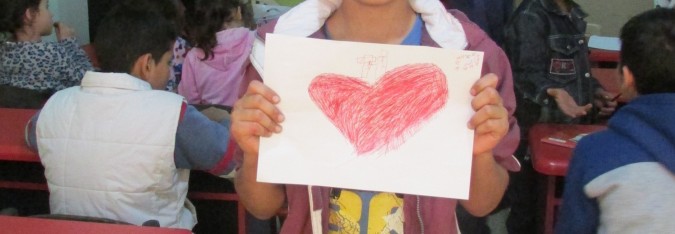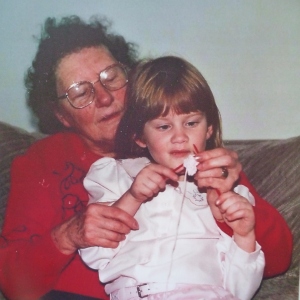My grandma died last week while I was in Lebanon. In everything I’ve done she’s always been there for me, so it was very hard not to be able to be with her in her last days. Back at home now, I’ve read the diary she kept, and it’s bittersweet to see how many references there are to me being absent from special occasions or to the sadness of saying yet another goodbye to me as I flew back to wherever I was living.

While I know how deeply my grandma supported me and my passion for working with children at risk, I’m realising that my decision to go has come at a cost.
Yet for me, this cost has been a choice I have made, and I am always only a plane ticket away from being together with my family again. But this is sadly far from the reality of many of the millions of people worldwide who have fled their homes because of violence and conflict. In Lebanon, Syrian families speak of the sadness of having left behind grandparents or other relatives unable to make the journey, while others lose touch with loved ones and have no way of knowing what has happened to them or where they are.
On this most recent trip to Lebanon, I felt perhaps the most at home I ever have on one of my visits; rather than having to deal with my sadness alone, I felt surrounded, known and cared for by many good friends. This gift of ‘family’ is the beautiful other side of the coin for the cost of the life I have chosen with its goodbyes and absences; experiencing it also depends on me being open to receive it.
I believe we’re at our best when we are welcoming strangers and being welcomed in return. Those who have fled from unimaginable situations of violence and pain are deeply in need of opportunities to receive, and to give, this real hospitality. But when we group these people together into a mass of “refugees”, “Muslims”, “migrants”, “people-who-aren’t-like-us”, we lose our chance to know people as individuals with stories to share and it becomes easy to be motivated by fear, rather than by love and compassion.
While the debate goes on and we talk on social media about taking too many or not enough refugees and fight about the controversial statements of politicians, the real situation continues unabated. Every moment, people in Syria and Lebanon, Jordan and Turkey, are weighing up what new risks to take: getting into more debt so the children can eat, taking a child out of school to cut costs, risking it all by getting onto a boat.
And also continuing under the surface, all this time, is the church in Lebanon, whose local members have been quietly caring for the Syrians they have come across; meeting their physical needs as best they can, but also sharing friendship and their lives at huge personal cost. It’s not always popular, and it’s not always easy, but after several years, these churches continue to know, love and value people.
The impact is immeasurable. Asked to draw pictures to describe the most significant change in their lives since participating in the child friendly space run by our church partner in north Lebanon, one child shared, “I’ve learnt that loving one another is the most important thing.”

In the UK and in the US the number of refugees we are talking about accepting is just a tiny percentage of the number who are in Lebanon, but I hope that those who get here will find such a genuine and lasting welcome. Let’s be willing to speak out against attitudes motivated by fear, and be ready to listen to stories, ready to be a friend, ready to be family.
Loving the ‘outsider’ is an attitude of heart and a choice we make even in the smallest things. As well as signing petitions and engaging in debate, let’s find ways to be the change we’re looking for right here and now, whatever that might look like. Let’s welcome the people we find difficult, notice people who might be lonely, really see the people around us; perhaps for some of us it might even look like engaging with and seeking to understand and love those who are sharing views that are very different to our own.
 I long to be like my grandma in her faithful, unfaltering care for me and many others over a lifetime, and like the Lebanese Christians I have the privilege to work alongside in their willingness to love and to listen for the long term, without counting the cost.
I long to be like my grandma in her faithful, unfaltering care for me and many others over a lifetime, and like the Lebanese Christians I have the privilege to work alongside in their willingness to love and to listen for the long term, without counting the cost.
Amidst the seemingly ever-growing voices of fear and unwelcome, how can we not just say, but be something different?
You were prepared from the inside out many years in the making for such a time as this. Proud of you. Sorry for your loss of gran in this life.
Justine.
LikeLike